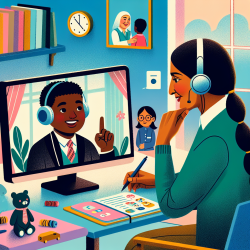Understanding the Impact of Social Media on Vaccine Misinformation
The recent research article, "From Facebook to YouTube: The Potential Exposure to COVID-19 Anti-Vaccine Videos on Social Media," provides valuable insights into the role of social media platforms in disseminating vaccine-related misinformation. As a practitioner in the field of special education and online therapy, understanding these dynamics is crucial for improving your practice and safeguarding the well-being of your students and clients.
Key Findings from the Research
The study highlights the pathways through which misinformation about COVID-19 vaccines spreads across social media platforms, particularly Facebook and YouTube. Despite efforts by these platforms to curb misinformation, anti-vaccine content continues to propagate, potentially influencing public perception and contributing to vaccine hesitancy.
The research identifies the following key points:
- Facebook and YouTube serve as major vectors for vaccine-related misinformation.
- Anti-vaccine videos are prevalent on both platforms, often shared by groups with significant engagement.
- YouTube's recommendation algorithm can create "echo chambers," where users are repeatedly exposed to similar anti-vaccine content.
- Public health agencies need to proactively create visible vaccine promotion campaigns on social media to counter misinformation.
Implications for Practitioners
As a practitioner, understanding these findings can help you develop strategies to mitigate the impact of misinformation on your students and clients. Here are some ways to apply this knowledge:
- Educate Yourself and Your Community: Stay informed about the latest research on vaccine misinformation. Share accurate information with your students, clients, and their families to help them make informed decisions.
- Promote Critical Thinking: Encourage critical thinking skills in your students and clients. Teach them how to evaluate the credibility of information sources and recognize misinformation.
- Collaborate with Public Health Agencies: Partner with local health agencies to disseminate accurate vaccine information. Use your platform to amplify public health messages and counter misinformation.
- Utilize Social Media Wisely: Leverage social media to share credible information and engage with your community. Be mindful of the content you share and its potential impact.
Encouraging Further Research
The study underscores the need for ongoing research into the mechanisms of misinformation spread on social media. As a practitioner, you can contribute to this effort by:
- Participating in Research Studies: Collaborate with researchers to provide insights from your practice. Your experiences can inform future studies and interventions.
- Advocating for Research Funding: Support initiatives that fund research on misinformation and its impact on public health.
- Staying Informed: Regularly attend conferences, webinars, and workshops to stay updated on the latest research findings and best practices.
By implementing the outcomes of this research and encouraging further investigation, you can enhance your skills as a practitioner and contribute to the broader effort to combat misinformation.
To read the original research paper, please follow this link: From Facebook to YouTube: The Potential Exposure to COVID-19 Anti-Vaccine Videos on Social Media.










